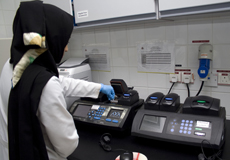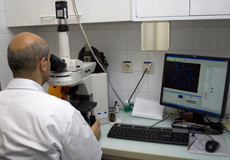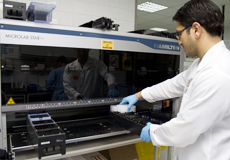
The section of Molecular Pathology and Genetics is a multi-disciplinary facility that serves many sections in the Department of Pathology and Laboratory Medicine.
Advances in the area of molecular genetics have profoundly increased our knowledge of human diseases. New techniques that allow the identification of the specific genes responsible for particular genetic disorders provide new approaches to disease diagnosis and will improve our understanding of the natural history of the disease. The section actively participates in education programs within the pathology department and the National Guard Health Affair level.
Currently, this section has two main laboratories:
-
Clinical Cytogenetics.
-
Molecular Pathology.
Clinical Cytogenetics:
The Cytogenetics Laboratory deals with the analysis of chromosomes at the cellular level using the light microscope. There are two main types of chromosomal analysis:
-
Constitutional chromosomal analysis: This test is usually performed on a peripheral blood specimen and investigates chromosomal abnormalities that occur before birth (congenital). Some of the most common indications for constitutional chromosomal analysis are: dysmorphic features, mental retardation, developmental delay, short stature, recurrent fetal loss, infertility, amenorrhea, abnormal ultrasound findings in fetus and family history of a chromosomal abnormality.
-
Chromosome analysis of neoplastic hematologic disorders: This test investigates chromosomal abnormalities that occur after birth and these are called acquired chromosomal abnormalities. The main indication in this category is cancer, mainly neoplastic hematologic disorders. The test is usually performed on a bone marrow or a blood specimen. This test is useful in the diagnosis, prognosis and management of hematologic malignancies.
Molecular Pathology:
The tests in Molecular Pathology Laboratory are based on the isolation and subsequent analysis of either DNA or RNA material, most commonly obtained from blood, bone marrow, serum, plasma or tissue of any other source. Molecular Pathology investigations play an increasingly significant role in the diagnosis, prognosis, treatment and prevention of many human diseases.
Currently, the Molecular Pathology Laboratory deals with Molecular Infectious tests, Molecular Oncology and Molecular Genetics tests. Through the employment of the Polymerase Chain Reaction (PCR) technique and other advanced molecular biology applications in many areas of diagnostic medicine it became possible to detect early stages of the disease and post-treatment residual disease.
One of the significant new tests to be introduced in the Molecular Pathology laboratory is the use of Array CGH (Comparative Genomic Hybridization) to provide a useful tool in the detection of chromosomal imbalances in those with mental retardation and / or multiple congenital anomalies.
Microarray-based aCGH is a technique to scan the genome for gains and losses of chromosomal material. This method has significantly high resolution and clinical yield. Currently, aCGH is used as an adjunct test to standard karyotype analysis, but likely to become the genetic test of choice.
Page Content
a preview to Molecular Pathology and Genetics section at Pathology and Laboratory Medicine Department at King Abdulaziz Medical City in Riyadh